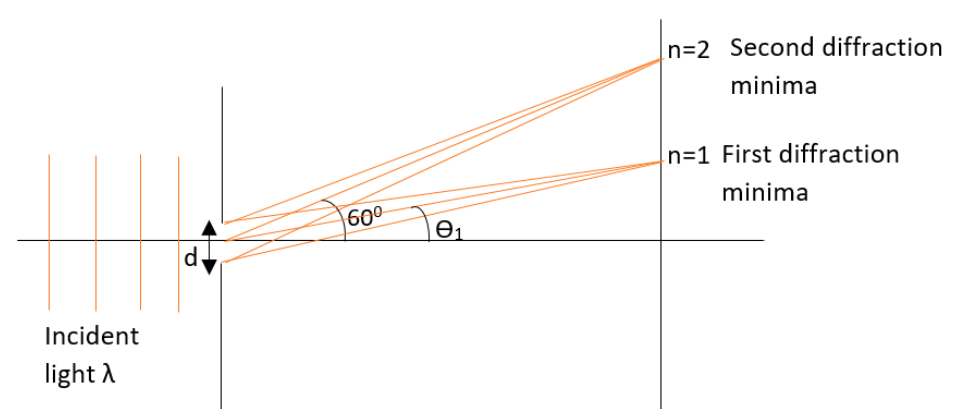Question
Question: Visible light of wavelength \(6000\times {{10}^{-8}}cm\) falls normally on a single slit and develop...
Visible light of wavelength 6000×10−8cm falls normally on a single slit and develops a diffraction pattern. It is found that the second diffraction minimum is at 60∘ from the central maximum. If the first minimum is created at θ1, then θ1 will be close to?
Solution
For the diffraction minima to occur, the product of the order of the patterns formation and the wavelength of the light will be equal to the product of slit width and the sine of the angle at which first minimum is produced. Using this relation, find the slit width of the arrangement for the second minimum. Similarly find the angle for the first diffraction also. These all may help you to solve this question.
Complete step by step answer:
For a diffraction minima to occur, the product of the order of the patterns formation and the wavelength of the light will be equal to the product of slit width and the sine of the angle at which first minimum is produced. That is, we can write that,
nλ=dsinθ
Where d be the slit width, λbe the wavelength of the light, θ be the angle of diffraction minimum and n be the order of the minima.
Here it has been mentioned that the wavelength of the light used is,
λ=6000×10−8cm
Therefore for the first condition,
The second diffraction minima has been produced. Hence we can write that,
n=2
And the angle between the central maxima and the second diffraction minima will be,
θ=60∘
Substituting this in the equation,
2λ=dsin60∘d=sin60∘2λ=34λ
Therefore the slit width has been obtained.
Now in the second condition,
The first minima has been produced,
n=1
Substituting the values accordingly in the equation will give,
1λ=dsinθ1sinθ1=dλ
Now let us substitute the values of slit width in it.
sinθ1=34λλ=43
From this the angle will be,
θ1=sin−143≈25∘

Note: In the single-slit diffraction, the bending phenomenon of light or diffraction occurs that causes light from a coherent source to interfere with itself and develops a distinctive pattern on the screen. This pattern is called a diffraction pattern. There will be minima and maxima in the pattern. Maxima is the portion of higher intensity and minima is the portion of smaller intensity.
